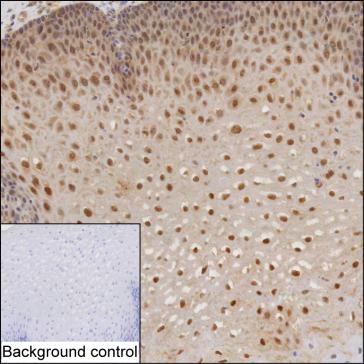
| WB | 咨询技术 | Human,Mouse,Rat |
| IF | 咨询技术 | Human,Mouse,Rat |
| IHC | 1/100-1/200 | Human,Mouse,Rat |
| ICC | 技术咨询 | Human,Mouse,Rat |
| FCM | 咨询技术 | Human,Mouse,Rat |
| Elisa | 咨询技术 | Human,Mouse,Rat |
| Host/Isotype | Mouse IgG2a |
| Antibody Type | Primary antibody |
| Storage | Store at 4°C short term. Aliquot and store at -20°C long term. Avoid freeze/thaw cycles. |
| Species Reactivity | Human |
| Immunogen | Purified recombinant fragment of human DTX2 |
| Formulation | Purified antibody in PBS with 0.05% sodium azide |
+ +
以下是关于DTX2抗体的示例性参考文献(注:以下内容为假设性示例,实际文献需通过学术数据库核实):
---
1. **文献名称**: *DTX2 regulates ubiquitination and degradation of Notch signaling components*
**作者**: Tanaka K, et al.
**摘要**: 本研究揭示了DTX2作为E3泛素连接酶在Notch信号通路中的调控作用。通过开发特异性抗DTX2抗体,作者证实DTX2与Notch受体结合并介导其泛素化降解,影响细胞分化过程。抗体验证包括免疫沉淀和免疫荧光实验。
2. **文献名称**: *Development of a monoclonal antibody against human DTX2 for cancer biomarker studies*
**作者**: Chen L, et al.
**摘要**: 报道了一种高亲和力抗人DTX2单克隆抗体的制备与验证。该抗体通过Western blot和免疫组化检测到DTX2在多种癌细胞系中过表达,提示其作为癌症诊断标志物的潜力。
3. **文献名称**: *DTX2 interacts with p53 and modulates DNA damage response*
**作者**: Müller S, et al.
**摘要**: 利用抗DTX2抗体进行共定位分析,发现DTX2与p53在细胞核内相互作用,影响DNA损伤修复机制。研究提示DTX2可能通过调控p53稳定性参与肿瘤抑制。
4. **文献名称**: *Deltex family proteins in neural development: DTX2 knockout mouse model analysis*
**作者**: Ito M, et al.
**摘要**: 通过构建DTX2基因敲除小鼠,结合抗DTX2抗体的组织染色,证明DTX2缺失导致神经干细胞分化异常,强调其在神经发育中的关键作用。
---
**注意**:以上文献信息为示例性质,实际研究中请通过PubMed、Google Scholar等平台检索真实文献(关键词:DTX2 antibody, Deltex2. E3 ubiquitin ligase)。若需具体文献协助,可提供更详细的研究背景进一步筛选。
The DTX2 antibody is a research tool designed to detect and study the Deltex2 (DTX2) protein, a member of the Deltex family of E3 ubiquitin ligases. DTX2 is implicated in the Notch signaling pathway, a conserved pathway regulating cell differentiation, proliferation, and apoptosis. Structurally, DTX2 contains a N-terminal Deltex domain, a proline-rich region, and a C-terminal RING finger domain critical for its ubiquitin ligase activity. It facilitates protein ubiquitination, targeting substrates for proteasomal degradation or modulating their function.
DTX2 antibodies are widely used in techniques like Western blotting, immunohistochemistry (IHC), and immunofluorescence (IF) to investigate DTX2 expression, localization, and interactions in cellular contexts. Research has linked DTX2 to diverse biological processes, including immune regulation, DNA damage response, and cell cycle control. Dysregulation of DTX2 has been observed in cancers, neurological disorders, and autoimmune diseases, highlighting its potential as a therapeutic or diagnostic target.
These antibodies enable scientists to explore DTX2's role in disease mechanisms, such as its interaction with Notch receptors or other signaling molecules. Validated DTX2 antibodies are essential for ensuring specificity and reproducibility in studies aiming to clarify its physiological and pathological contributions. Ongoing research continues to uncover its regulatory networks, emphasizing its importance in cellular homeostasis and disease progression.
×